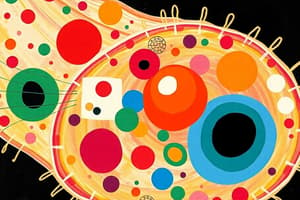Podcast
Questions and Answers
What are organelles?
What are organelles?
- Little cell structures that have specific functions (correct)
- Elements in the periodic table
- Types of tissues
- Large structures in plant cells
What is the function of the cell membrane?
What is the function of the cell membrane?
Surrounds and protects the cell, controls what enters and exits the cell.
Describe the cytoplasm.
Describe the cytoplasm.
A gel-like substance inside the cell where chemical reactions occur, consisting of 80% water.
What is the role of the cell wall?
What is the role of the cell wall?
What does the nucleus do?
What does the nucleus do?
What is the function of chloroplasts?
What is the function of chloroplasts?
Describe mitochondria.
Describe mitochondria.
What are ribosomes responsible for?
What are ribosomes responsible for?
What is the endoplasmic reticulum?
What is the endoplasmic reticulum?
What does the Golgi body do?
What does the Golgi body do?
What is the function of the nucleolus?
What is the function of the nucleolus?
What are lysosomes often referred to as?
What are lysosomes often referred to as?
What does a vacuole do?
What does a vacuole do?
What is the cytoskeleton?
What is the cytoskeleton?
What defines a tissue?
What defines a tissue?
What is considered an organ?
What is considered an organ?
Flashcards are hidden until you start studying
Study Notes
Cell Organelles Overview
- Organelles are specialized structures within eukaryotic cells, each performing specific functions essential for cell survival and operation.
- Key cell components include the cell membrane, cytoplasm, cell wall, nucleus, and various organelles.
Key Cell Structures
-
Cell Membrane
- Acts as the security system, surrounding and protecting the cell.
- Regulates the entry and exit of substances, maintaining homeostasis.
-
Cytoplasm
- A gel-like matrix where most of the cell's biochemical processes occur.
- Composed of approximately 80% water, providing a medium for chemical reactions.
-
Cell Wall
- A rigid outer structure found in plant cells, providing shape and protection.
- Composed mainly of cellulose, distinguishing plant cells from animal cells.
-
Nucleus
- Serves as the control center of the cell, housing genetic material (DNA).
- Surrounded by a nuclear membrane, it orchestrates cell activities by regulating gene expression.
Energy and Production
-
Chloroplasts
- Green organelles present in plant cells that facilitate photosynthesis.
- Capture sunlight energy to synthesize glucose, critical for plant nutrition.
-
Mitochondria
- Known as the powerhouse of the cell, they store and release energy through cellular respiration.
- Essential for energy production within all eukaryotic cells.
Protein Synthesis and Transport
-
Ribosomes
- Sites of protein synthesis, either floating in the cytoplasm or attached to the endoplasmic reticulum (ER).
- Essential for translating genetic information into functional proteins.
-
Endoplasmic Reticulum (ER)
- Functions as the cell’s railway system, moving materials around.
- Types include smooth ER (lacks ribosomes) and rough ER (with ribosomes for protein synthesis).
-
Golgi Body
- Functions as the cell's post office, sorting and packaging proteins into vesicles.
- Vesicles transport and deliver substances both within the cell and to the outside environment.
Cellular Maintenance and Storage
-
Nucleolus
- Located within the nucleus, responsible for manufacturing ribosomal RNA (rRNA) which forms ribosomes.
-
Lysosomes
- Function as the cell's waste disposal system by digesting food molecules, waste products, and damaged organelles.
-
Vacuole
- Serves as a storage compartment for food, water, and waste materials.
- Particularly large in plant cells, resembling a vacuum due to its capacity to store large amounts of substances.
Structural Support
- Cytoskeleton
- Provides structural support and helps maintain or change the shape of the cell.
- Composed of a network of fibers that aid in cell movement and organization.
Tissue and Organ Formation
-
Tissue
- A collection of similar cells working together to perform a specific function, like muscle or nerve tissue.
-
Organ
- Comprises two or more different tissues collaborating to execute a particular function, such as the heart or liver.
Studying That Suits You
Use AI to generate personalized quizzes and flashcards to suit your learning preferences.




